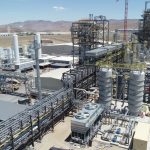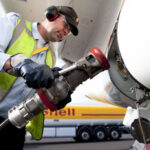Rolls-Royce and Shell have signed a long-term agreement to progress the use of sustainable aviation fuel (SAF) in aircraft engines and support the aviation industry’s decarbonisation efforts. Under a memorandum of understanding (MoU), the two companies will expand on existing areas of cooperation, including the engine manufacturer’s new SAFinity service for the business aviation sector and for which Shell is the exclusive SAF supplier. They will also work together on demonstrating the use of 100% SAF as a full drop-in engine solution, building on Rolls-Royce’s ongoing ground test programme for which Shell has provided the SAF. Currently, SAF can only be blended up to a maximum 50% with conventional jet fuel and the two companies will explore opportunities to help progress the use of 100% SAF towards certification. Rolls-Royce has committed to making all of its civil aero-engines in production compatible with 100% SAF by 2023 and increasing the share of its R&D spend on lower and net zero carbon technologies from 50% to at least 75% by 2025.
Both Rolls-Royce and Shell have set respective targets to achieve net zero emissions by 2050 and under the MoU they will collaborate on finding decarbonisation solutions, including both contributing technologies and expertise to help reduce operational emissions. Shell says it will assess opportunities to support Rolls-Royce in reducing travel emissions through the supply of SAF, while the engine manufacturer will lend its technical expertise to advise Shell in its new fuels development, as well as low-carbon energy alternatives for new aircraft and power systems.
The MoU also envisages the two partners working together to proactively engage industry bodies and forums to progress strategic policy issues, and address existing barriers associated with the aviation sector’s decarbonisation efforts.
“Being from different parts of the aviation value chain means Rolls-Royce and Shell bring complementary expertise, experiences and ideas to the table,” said Anna Mascolo, President, Shell Aviation. “Wide-ranging cooperation can drive new solutions that will help the aviation industry and our customers navigate a pathway to net zero.”
Added Paul Stein, Chief Technology Officer at Rolls-Royce: “We believe that working together on these aims can deliver benefits for both the development of new innovations as well as collaborating to find ways to unlock the net carbon emissions reduction potential of technology that is already in use today. SAFs will not only power large aircraft and business aviation but also hybrid-electric Urban Air Mobility and the forthcoming generation of hybrid fixed-wing city hoppers, which is why we place such importance on the ramp up of SAF adoption across the industry.”
The SAFinity service was unveiled in May at the virtual European business aviation convention EBACE Connect with launch customer Luxaviation Group, one of the world’s largest business aircraft operators. Catering initially for business aviation, customers can build in SAF purchase to their sustainability programmes that include investment in carbon offsetting projects, with a certain amount being spent on buying SAF from Shell.
“This will help increase demand and accelerate the availability and use of SAF in the aviation industry – with SAFinity, we simply want to stimulate the market,” a Rolls-Royce spokesperson told GreenAir. “For business aviation customers, who are really willing to support this journey, it’s about minimising their carbon footprint while also investing in the SAF infrastructure.
“The good thing is that this service works as book-and-claim, which means we are making sure the SAF is produced and used anywhere in the aviation system rather than having to ensure it’s at a certain airport or that a specific engine is safe to operate on SAF. We buy a certain amount of SAF and our supplier will make it available somewhere in the system.”
The Rolls-Royce commitment to having all its civil aero-engines in production compatible with 100% SAF, through testing, by 2023 also means two-thirds of the current fleet of Trent large engines and three-fifths of business jet engines will be SAF-ready within three years. This aligns with the UN Race to Zero breakthrough goal of 10% of all the fuel used in aviation being SAF by 2030, states the company. Engines for other sectors also have 2023 targets and achieving all 2023 targets now forms part of executive remuneration policy.

Top photo: Rolls-Royce has tested 100%SAF on its Pearl 700 business aviation engine that is being developed at Rolls-Royce’s Center for Business Aviation Engines in Dahlewitz, Germany













More News & Features
SAF One announces new investment and technology partners for Middle East SAF project
New initiative formed to accelerate SAF adoption and production in the Pacific Northwest
EcoCeres opens new Malaysia production facility as SAF ambition in Asia scales up
Aviation, shipping and fuel leaders convene in Rotterdam to accelerate sustainable fuels scale-up
EU SAF mandates will have to be revised, predicts French oil chief
Lessons learned from the collapse of Fulcrum BioEnergy